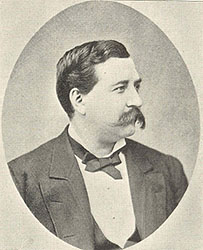

Among the recommendations for the proposed celebration of the Town's 250th anniversary, which the Committee of Fifty have already made at the present writing, is the name of Hon, Samuel Fessenden, as the orator of the occasion. The spontaneity and readiness with which this proposition was adopted by the Committee, and the general favor with which the suggestion was received by the public at large, constitute a flattering compliment to a townsman whose successful career as a lawyer and as a leader in State and national politics, may appropriately be noted here as a part of the history of Stamford in recent years. A member of the distinguished Maine family which, in the person of his uncle, the late William Pitt Fessenden, furnished to the country one of the most able and patriotic statesmen of the civil war, and of the reconstruction period immediately following, and a son of the late Samuel C. Fessenden, who, with another uncle of the subject of this sketch, Thomas A. D. Fessenden, deceased, were members of the 37th Congress from their native State, Mr. Fessenden has more than revived the honorable celebrity attaching to a name already historic. Though most widely known in the field of national politics, as an organizer and leader of rare sagacity and energy, and as possessing that power in popular affairs which only men of uncommon person al magnetism and genial temper can wield, his most cherished triumphs have been won in the arena of his chosen profession, where he has gained enviable distinction and a place in the front rank as an able lawyer and effective pleader at the bar.
Mr. Fessenden was born in Rockland, Maine, April 12, 1847. The opening of the war found him preparing for college at the Lewiston Academy. Two years later, then a well-grown boy of sixteen years, he resolved to give up or postpone his college plans and enter the army, which he did by enlisting as a private in the Seventh Maine Battery. He served under Grant in that fierce, destructive, but glorious campaign marked by those names of dread import: Wilderness, Spottsylvania, Cold Harbor and Petersburg, and, on a recommendation from General Grant, received an appointment by President Lincoln, as First Lieutenant and afterwards as Captain, in the Second U. S. Infantry. His preference being for the artillery service, he declined promotion in the regulars, to accept a commission in the First Maine Battery. Later, he was appointed on the staff of Major General A. P. Howe, and remained in that position until he retired to civil life soon after the close of the war. He then applied himself, with characteristic energy and determination, to the study of law, at the Harvard Law School. March 4, 1869, he was admitted to the Fairfield County bar—his family having moved to Stamford. He began the practice of his profession as a member of a law firm in which his seniors were the late Joshua B. Ferris and Calvin G. Child. Upon the retirement of Mr. Child to form a co-partnership with Mr. N. R. Hart, the firm remained under the title of Ferris & Fessenden, until the withdrawal of Mr. Ferris from all active professional work, when the present firm of Fessenden & Carter was formed. Mr. Fessenden's eminent qualities as a lawyer, his many and remarkable legal successes, and his work as the State's Attorney, are among the most notable and striking incidents in the history of the Fairfield County bar for the last twenty years, more especially during the last half of that period.
His public political career began with his election to the legislature in 1874, when he was but 27 years of age. He was appointed on the judiciary committee, and during the session attracted favorable attention by some of the most eloquent and effective speeches heard in that body. In 1879, when he again appeared as a member of the House, it was as a legislator of the largest influence, and a recognized leader of his party. He had been, in 1876, one of the delegates from Connecticut, in the National Republican Convention at Cincinnati which nominated President Hayes. In 1884, at the beginning of the Blaine campaign, he was elected secretary of the National Republican Committee, and manifested in that capacity executive talents of the highest order, and an enthusiasm and energy stimulated to their best efforts by his intimate acquaintance with, and admiration for, the great Maine statesman who was the candidate of his party for the Presidency. He was a delegate-at-large to the Republican National Conventions of 1880 and 1888—in the year last named chairman of the delegation. In 1872 he was appointed by Governor Jewell Judge Advocate of the Fourth Regimental District of the National Guard, with rank of Major. He is still a member of the National Committee, and just now is actively engaged, in promoting the candidacy of President Harrison for a second term. Mr. Fessenden's popularity in Connecticut is well known and undoubted, and his capacity for public service of the most important kind so widely recognized, that his friends confidently anticipate for him the bestowal of the highest national honors which it is in the power of a single State to confer.
Davenport Exhibit: Samuel Fessenden
back
to Old Town Hall
Picturesque Stamford, 1892
Research Library
917.46 Stamford G